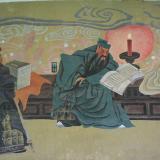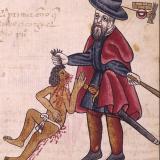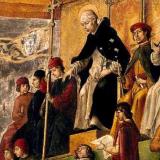Latest Episodes
Blog Posts
Comments
- 4. Open Season: the Historical Context
Posted on
The historical context of classical Chinese philosophy, and how ancient Chinese historical works themselves became works of philosophy.
- 443. Marketplace of Letters: Iberian Humanism
Posted on
Fray Luis de Leon, Antonio Nebrija, Beatriz Galindo and other scholars bring the Renaissance to Spain.
- 3. Karyn Lai on Classical Chinese Philosophy
Posted on
Co-host Karyn introduces herself to the listeners and talks about the challenges of tackling classical Chinese philosophical texts.
- 442. Scott Williams on Disability and the New World
Posted on
In this interview we learn about the main issues in modern-day philosophy of disability, and the relevance of this topic for the European encounter with the Americas.
- 2. The Only Constant: Change and the "Yi Jing"
Posted on
Early Chinese philosophers were deeply aware of a world that is constantly changing. We consider how they responded to uncertainty about change.
- 441. Lambs to the Slaughter: Debating the New World
Posted on
Bartholomé De las Casas argues against opponents, like Sepúlveda, who believed that Europeans had a legal and moral right to rule over and exploit the indigenous peoples of the Americas.
- 1. Journey of a Thousand Li: Introduction to Chinese Philosophy
Posted on
Introducing Chinese philosophy through the concept of "dao," a fundamental word in classical Chinese philosophy, with a range of meanings across its different traditions.
- 440. Longitudinal Studies: Exploration and Science
Posted on
Iberian expeditions to the Americas inspire scientists, and Matteo Ricci’s religious mission to Asia becomes an encounter between European and Chinese philosophy.
- 142. Final Chat with Chike Jeffers
Posted on
How Africana philosophy looked to a young Chike Jeffers, coming into the field in the early 21st century.
- 439. Cancel Culture: The Inquisition
Posted on
How religious persecution and censorship shaped the context of philosophy in Catholic Europe in the sixteenth century.
- Posted on
- Posted on
- Posted on
- Posted on
- Posted on
- Posted on
- Posted on
- Posted on
- Posted on
- Posted on
- Posted on
- Posted on
- Posted on
- Posted on
- Posted on
- Posted on
- Posted on
- Posted on
- Posted on
- Posted on
- Feed8 hours 7 minutes ago3. Karyn Lai on Classical Chinese Philosophy
- Podcast Feed8 hours 8 minutes ago3. Karyn Lai on Classical Chinese Philosophy
- Sixth book2 days 6 hours agoComments Page
- Albert the Great citing Avicenna2 days 6 hours agoComments Page
- Re: Xunzi passage2 days 6 hours ago4. Open Season: the Historical Context
- please not!! Please continue…2 days 18 hours agoWho should be covered in the 17-18th centuries?
- Xunzi passage3 days 9 hours ago4. Open Season: the Historical Context
- Classification of people in relation to custom3 days 9 hours ago4. Open Season: the Historical Context
- That's awsome. I love this…3 days 9 hours agoWho should be covered in the 17-18th centuries?
- Amerindian4 days 4 hours agoWho should be covered in the 17-18th centuries?
Overview
Peter Adamson, Professor of Philosophy at the LMU in Munich and at King's College London, takes listeners through the history of philosophy, "without any gaps." The series looks at the ideas, lives and historical context of the major philosophers as well as the lesser-known figures of the tradition.
The latest episodes are listed on the left, or you can view the list of all episodes published so far


Series of podcast episodes (MP3 files) are grouped together as RSS feeds (requiring an RSS reader such as Feedly or a podcatcher), zip files (requring a zip tool such as 7-zip to unzip the downloaded file).
You can leave a comment on any of the individual podcasts, on the website as a whole or on Peter's blog.
















